 |
 |
| |
|
|
| |
|
|
| |
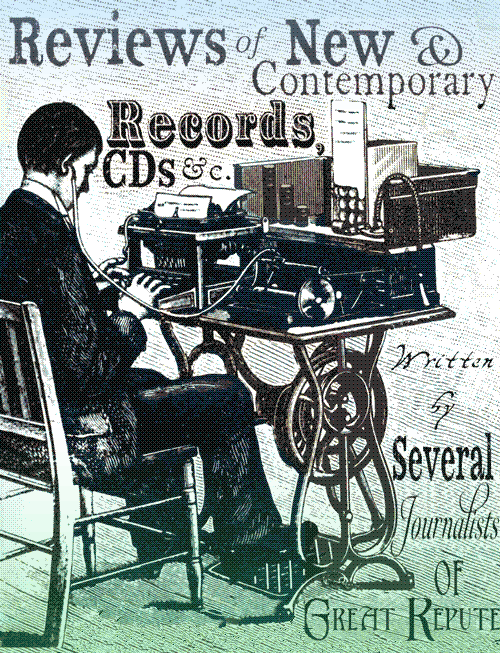 |
|
| =
August 2021= |
|
|
| Birds of Maya |
Slift
|
Rodrigo
Amarante
|
| ÉVÉ
|
| The Wheel |
| I
See Hawks in LA |
Andrew Wasylyk
|
Anton Barbeau
|
|
| |
| |
| |
| |
| |
| |
| |
| |
| |
| |
| |
| |
| |
|
|
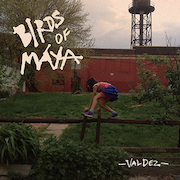 |
BIRDS
OF MAYA – VALDEZ
(LP
on Drag City
Records)
Birds
of Maya are a classic and pleasingly noisy
guitar, bass and drums trio drawn from the cream
of the vibrant Philadelphia lo-fi garage scene.
Sightings outside of gigs and jams in and around
Philly are rare but all three members have their
fingers in many pies and can be seen and heard
in a number of well-known outfits. They’ve been
getting together on occasion as Birds of Maya to
generate some musical mayhem over quite a few
years now but ‘Valdez’ is only their fourth
record and their debut for Drag City having
previously graced the Holy Mountain, Richie and
Little Big Chief labels. It was actually
recorded back in 2014 soon after the release of
their previous record in 2013 but its ageless
scuzzy splendours sound bang up to date – just
blow off the dust and yesterday doesn’t seem so
far away.
‘High
Fly’ thrillingly introduces the six tracks
making up this record and instantly we have the
smell of paint stripper in the sweaty garage air
with searing, distortion coated riffs, a rolling
fireball of drums and bass and a chaotic mess of
frantic guitar solos and punky vocals with a
touch of the Mark E Smith school of snarl and
sneer for added enjoyment. The short and searing
‘BFIOU?’ follows and has a distinctive and
enjoyable touch of hairy early eighties NWOBHM
(hands up who remembers that acronym? Everyone?
Excellent, we’ll continue…) in its urgent riff
and a vocal abandon remaining just the right
side of unhinged. ‘Busted Room’ slows the pace
down with no less power and energy invested in
its crunchingly relentless riff, hammer blow
drums and intense, frenetic guitar solos over a
near 10 minute assault on your senses.
‘Recessinater’ is a lengthy excursion in the
world of psychedelic garage boogie and a tune of
two halves starting with quirky off kilter
guitar lines bobbing and weaving around each
other and an undeniably catchy feel thanks to
the upbeat and solid drum and bass interplay
before things speed up and become more frenetic
and uncontrolled. ‘Front Street’ returns to
brevity and metallic riffing with a touch of
Hawkwind to these ears in its vocal feel and
cosmic punk propulsion. ‘Please Come In’ keeps
the temperature high and rounds things off with
a stomping and relentless garage riff
underpinning an intense, distorting vocal and
guitar soling with just the right amount of wild
abandon.
This
is a thrilling listen and it’s amazing that a
record this good could remain unreleased for so
long but thankfully we have it now. It’s got a
brutal elegance and infectious energy with the
raw appeal of a jam where the band knows when to
explore and when to stop and a musical nous,
coming from musicians who are clearly enjoying
playing together and creating those little
sparks and sometimes incendiary flames to put a
smile on the face of both band and listener.
I’ve mentioned a few influences that stand out
to these ears and there is of course a deep and
respectful nod to The Stooges and their ilk but
Birds of Maya are much more than your average
noisy heavy psychedelic garage trio. If Birds of
Maya are recording anytime soon, let’s hope we
hear the results much more quickly than 7 years
after the event.
(Francis Comyn)
|
|
|
|
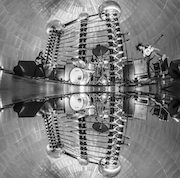
|
SLIFT
– LEVITATION SESSIONS
(LP, Digital on The
Reverberation Appreciation Society)
Slift, the fabulous hard psych
three-piece from Toulouse, France, is right on
the cusp of busting their international audience
wide open. Their
last two albums, La Planéte
Inexplorée
(2018) and Ummon (2020), rendered them a
powerful emerging psychedelic force to be
reckoned with, with another studio album baking
in the oven. They
recently made a live appearance for the vaunted
Levitation Sessions series of livestreams and
albums that’ve been helping us all get through
this worldwide mess, which will only enhance
Slift’s rapidly growing reputation as both a
brilliant studio and live band.
If you haven’t seen or heard any of it,
leap straightaway to youtube to check out their
ruthless performances of “Ummon” and “Heavy
Road.” While
many of the Levitation Sessions have been filmed
in places like abandoned warehouses,
ampitheaters, and the desert, Slift looks to be
on what could be the set of Doctor Who
or Flash Gordon.
It’s actually CEMES, the French National
Center for Space Studies, in a site called “la
Boule” (the Bowl), and the gigantic retro future
contraption in the background is the top of an
old microscope.
The place produced what Slift called “an
astronomical level of reverb” to reckon with
during filming and recording.
Take-no-prisoners opener “Ummon,” the
title track from their most recent album, is
frankly jaw-dropping.
Man, these three guys put out a massive,
massive sound in that old rocket ship.
Drummer Canek Flores and bass player Rémi
Fossat
lay down an airtight, mega-propulsive groove,
while guitarist and vocalist Jean Fossat is
simply an unstoppable force, playing guitar and
singing as if his very life depended on it.
Jean and Rémi
are brothers, and play a matching set of white
Gibson SG guitar and bass.
Jean was once asked how he’d describe
their live shows, and he responded:
“BrRRRrrrRrRrRRAAaAAaaaaaaafffffffffZZZZzzzzzzzZzzzzziziIIII
ziiiiiiiiiiiiiiiiiiiiWooOOOOOOoooooooooooopppppppppppZZZZZzzzz
GrrrrrrrrrrrrrrrrRRrrrrrrrrrrrrrrrUUuuuuuuuuuuu.
bbbrrrrr brrrrrrr.
brrrrrrrrrrr.
FuuuuUUUuuuuuZZZZzzzzzzzzzzCRRSHHH
HHHHHHHHHHHHHHhhhHHH
!”
I can pretty much concur.
That
they
keep up this level of energy and intensity for
eight tracks totaling an hour and 15 minutes, is
a credit to them.
You more than get your money’s worth, and
they leave the impression they could keep going
and going, if the planetary scientists next door
can handle all the aggression and the titanic
racket.
Slift
burns
on with the flaming “Thousand Helmets of Gold.”
They’re also masters of light and shade,
and of combining a galloping rhythm track with
Jean Fossat’s killer guitar playing, reminiscent
of Zep’s “Achilles’ Last Stand.”
That
light
and shade is on full display on Ummon’s suite
“Citadel on a Satellite,” here expanded out to
fifteen glorious minutes, and a real highlight.
Slift combines their in-your-face
fierceness with a slower, synth-augmented space
cruiser excursion, whose chilling, reverberating
ending demands an enormous light show.
This segues brilliantly into the heavy,
sledge-hammering “Hyperion,” as on the studio
album.
On
“Heavy
Road,” Jean Fossat brings throat-shredding
vocals, guitar feedback, wah-wah, and synth
flourishes into a crashing performance, with the
usual rock-solid rhythm from Rémi
Fossat and Canek Flores.
When
I
hear Slift play, they just suck me in from the
start with their big, fierce sound and thrashing
soloing, and I can’t get enough of it.
Levitation’s original double LP, in
eye-popping artwork and decadent Splatter Vinyl,
sold out in the blink of an eye.
However, they did a rare – for them –
repress, and you can still get it in all its
glory. I
can’t wait for the new studio album and live
appearances (with audience), but this will
gladly suffice in the meantime.
(Mark
Feingold)
|
| |
|
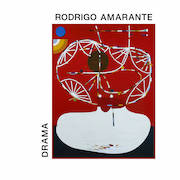 |
RODRIGO
AMARANTE - DRAMA
(LP, CD, Cassette on Polyvinyl
Records)
This may be Rodrigo Amarante’s second
solo album, but the brilliant 44-year-old Rio de
Janeiro-born singer and multi-instrumentalist,
living in L.A. the past few years, has certainly
been around. In
his native Brazil, he was in the successful rock
band Los Hermanos in the early Oughts.
Following that, he joined the
twenty-piece samba band Orquestra Imperial.
After moving to L.A., he has worked with
artists such as Devendra Banhart and Fabrizio
Moretti of The Strokes, and formed the band Little
Joy with Moretti.
He broadened his audience with his 2015
song “Tuyo,” the perfect theme song to the
excellent Netflix series Narcos and its
successor Narcos Mexico (both series
well worth checking out).
As a recording artist, Amarante reminds
me of a sort of Brazilian Bryan Ferry.
Like the esteemed Mister Ferry,
Amarante’s an incurable romantic.
He couldn’t make an unromantic record if
he tried. His
gentle, drowsy, crooning voice is both sensual
and relaxing. However,
also like Ferry, there’s much more to unpack
beneath the surface than just romance, and
Amarante has the true heart of the artist.
His lyrics wax of philosophy, personal
experience, poetic imagery, and yes, love.
Drama has both the sway and the ghosts of
the greats such as Jobim and Gilberto, and the
confident swagger of his current digs.
He may get by with a little help from his
friends, but on Drama, Amarante also plays most
of the instruments, as many as ten.
Also reflecting his in-betweenness,
about half the songs are in English and half in
Portuguese, and one even mixing both.
Amarante has always been interested in
movie-making, and he’s dabbled in it a little
bit on the side.
Likewise, he created Drama to be sweeping
and cinematic. Opening
with the brief noirish instrumental title track,
a string section plays behind crowd noise in a
club, and commotion we can’t see.
This transitions to the kind of song we
came here for, the lovely single “Maré.”
This one’s got it all, and you can’t not
like it. Starting
with the same rhythm on Jethro Tull’s “Living in
the Past,” (DA da da - DA da da -
DA DA), Maré
(The Tide) bubbles with excitement, and full of
a big band widescreen sound.
He sings (translated from the Portuguese)
“I needed to feel/I can only insist/dream and
destiny have/between reason and faith/I know
luck is not wanting more than to live/it’s
having love to give.”
Amarante goes from this to “Tango,”
which starts with a
lying-in-a-hammock-near-the-beach-strumming-a-guitar
feel, which eventually spreads its wings into a
full band arrangement.
“Tango” is a charming track about simply
dancing and falling in love.
“Tara,” a story sung in Portuguese about
a relationship that didn’t work out, is all late
night bossa nova arrangements over Amarante’s
gently strum guitar, and even has an occasional
1930s style big band horn section and chorus for
accent. It’s
the perfect soundtrack for the sparsely lit,
black and white tuxedo-and-gown night club scene
from the film in your head that naturally
unfolds when you listen to Drama.
The carelessly upbeat “Tanto” returns to
the very welcome poppy territory of Maré.
Full of punchy horns and a lightly
swinging Sergio Mendes & Brasil ‘66-type
arrangement, “Tanto” again belies its poppiness
with impressionistically poetic lyrics
(translation required).
Again, the cinematic sense of agency
takes over by the end as a string section sways
to the sensuous rhythm.
“Tao” is sung in both Portuguese and
English and is probably the most artistic song
on the album. Sounding
like it could’ve been included on Van Morrison’s
Moondance album, Amarante sings “The Tao
is an empty cup/poured and never filled/hidden
deep and yet above/before the gods could dance.”
The seductive “Eu Com Você”
is more poetry set to swinging Technicolor sonic
imagery.
Closer “The End” wraps Amarante’s
piano-based melody around Gabriel García
Márquez-type
lyricism,
and the Hollywood strings take us out while he
sings “To live is to fall.”
Drama is an album which takes aim and
succeeds on many levels.
Its dreamy and swirling, yet relaxing,
feel, is bolstered by Rodrigo Amarante the
songster, poet and aspiring auteur.
(Mark
Feingold)
|
| |
|
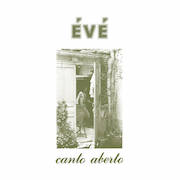
|
ÉVÉ
– CANTO ABERTO
(LP, Digital on Komos)
If you’re looking for a record to give
you lots of smiles and put you into an
undeniably pleasant mood, you can’t go wrong
with this ultra-rarity re-release from 1979,
courtesy of the still new French label Komos.
Évé,
aka Everaldo Marcial, was originally from Sao
Paulo, Brazil, and fled the dictatorship in 1974
for France. He
recorded this sole album in 1978 in Parisian
suburb Courbevoie (site of the 1878 World’s
Fair), and it was released a year later on the
Free Lance label.
The album soon dropped out of sight, and
by the early 1980s so did Évé,
moving to the United States and sadly giving up
music.
But what a gift he left behind for us!
Its nine songs are filled in the MPB
style with soft, but ever so lively acoustic
guitar playing by Évé
and Pascal De Loutchek, plus plenty of
percussion by a mix of fellow expatriates and
local Parisian musicians, guided by Évé’s
and the gang’s wonderful singing in Portuguese.
African American flute/tenor
saxophone/oboe player Bruce Tobé
Grant served as music director, and contributed
some delightful reed and flute accents to the
proceedings.
All songs are Marcial originals,
although “Os Ratos” seems inspired by the
well-traveled “Trem de Doido” (translation:
“Crazy Train” – no, not that one),
originally by Lô
Borges in 1972 and covered many times since.
The title track is especially beautiful,
alternating between Évé’s
and De Loutchek’s guitars and Bruce Tobé
Grant’s soaring flutes.
Those flutes reappear like a pair of
doves flying majestically together up, over,
below and all around the melody in “Zoeira.”
The album is just a celebration of
joyful acoustic guitar playing from start to
finish. My
favorite track is the instrumental “Sala dos
Espelhos,” which showcases the beautiful
playing, and is full of classical influences and
rippling little six-string surprises, sunbursts
and shooting stars.
On one hand, what a shame that Évé
didn’t record more.
He was obviously overflowing with talent.
But on the other hand, his sole album is
so magnificently uplifting, and we are fortunate
to have it. Kudos
to Komos for re-releasing it on vinyl for us to
share.
(Mark
Feingold)
|
| |
|
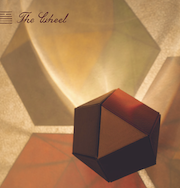 |
THE WHEEL
– S/T
(thewheelcgy.com)
This was a lovely surprise to receive, full-cream
melodic Canadiana that’ll put a crease in your
denims and a smile on your face. Lovingly
crafted in glorious analogue and meticulously
mixed using vintage equipment, The Wheel's
self-titled debut LP is unashamedly packed with
songs of love, loss and longing.
‘No One Can Save Her’ kicks off with a beautifully
full-toned guitar that rings like the
introduction to a Neil Young and Crazy Horse
epic. ‘Worry Doll’ (and the title track itself
over on the B side) sounds like it’s lifted
straight off the Workingman’s Dead sessions; a
hint of which is woven into the very fabric of
the band’s being it seems. ‘Forward’ features a
gorgeous pedal-steel guitar riff from Wayne
Garrett, one of the stars of this particular
show; and ‘Mind Leads’ features world-weary
vocals that put me in mind of the Miracle
Legion, which is no bad thing at all. Finally
‘Slow Dance’ gradually works its way into your
heart with some absolutely gorgeous guitar lines
from Jamey Lougheed and Mike Corbiell. There’s
four guitarists in all including electric, lap
steel and pedal steel plus vocalist and acoustic
guitarist Patrick Whitten. It was Patrick that
took the trouble to answer some of my questions
regarding the background to The Wheel.
“The Wheel began as a psychedelic folk electric
guitar duo sometime in 2012 [and] was
fully formed in 2015 with a bunch of like minded
music enthusiasts and record collectors from
several different bands all falling into place
at just the right time to cater to a collection
of songs I had written during the
preceding years. We've been practicing and doing
live performances ever since. As for the record,
Danny Vescarelli (Devonian Gardens) tipped me
off that local studio, "Magnetic North", not
only had the best hourly rate in town, but was
also the best fully analog studio that Calgary
had to offer. We went in and laid down the bed
tracks live off the floor in two days, then I
managed to nitpick the thing for nearly 4 years
before its completion in 2020”. And as for that
magical something that they seem so successfully
to have captured? “The title track was recorded
onto a Stephens 821b tape machine that belonged
to The Grateful Dead from 1979 well into the
early 80's as part of their live recording rig."
So that explains that, then!
Any future plans for The Wheel? “We're nearly ready
to jump back into the studio to record the
follow up album, my solo acoustic record is
completed and ready for release, and I've got
enough songs written for at least the next two
The Wheel albums which should commence recording
later this year.”
A suitably up-beat note to end on, and far better
than my original intention which was to sign off
by crediting Patrick as being the spokesman for
the Wheel.
Sorry…..
(Phil)
|
|
|
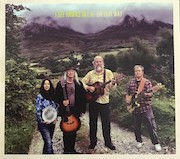 |
I
SEE HAWKS IN LA – ON
OUR WAY
(CD/DL Western Seeds Record company www.iseehawksinla.bandcamp.com)
On
Our Way is the new album from Californian
country rock group I See Hawks In LA, this is
their tenth album and for me their best to date.
The band consists of Rob Waller on lead vocals,
acoustic guitar and synth. Paul Lacques on
guitars, lap steel, autoharp, mandolin and jaw
harp, Paul Marshall plays bass and Victoria
Jacobs plays the drums, with all the band
members contributing backing vocal harmonies.
They formed at the tail end of the last century
and have played many shows with artists like
Chris Hillman, Dave Alvin, Lucinda Williams and
many more through the years; indeed playing live
is where they are at. This new album also sees
contributions from ace fiddler Brantley Kearns,
Danny McGough, Dave Zirbel and Woody Aplanalp
from Old Californio, amongst others.
It
kicks off with the mandolin led ‘Might’ve Been
Me’, replete with pedal steel by Paul Zirbel
which wouldn’t be too out of place on American
Beauty/Workingman’s Dead era Grateful Dead, this
is followed by the very catchy title track ‘On
Our Way’, a very strong opening pair of songs.
’Know Just What To Do’ is slightly more
expansive, it starts (and ends) with some mad
twisted fiddling from Brantley and some
backwards guitar, before unfolding into a gentle
song of revelation. This is followed by the
short, bluesy ‘Mississippi Gas Station Blues’.
Victoria wrote and sings the wistful ‘Kensington
Market’, a well placed indie rock song which
details the various sights, sounds and people
encountered there; it also features some fine
organ from Danny.
The
short ‘Kentucky Jesus’ is a song ostensibly
about an alternative war hero and comes with
contributions by Richie Lawrence on accordion.
‘Geronimo’ is a great dusty Native American tale
imbued with plenty of telecaster, pedal steel
and mandolin breaks; it is pure country rock
gold. ‘Stealing’ is another little gem of a song
and sees contributions on vocals and guitars
from Old Californio’s Woody. ‘If I Move’ is sees
the band playing a Byrds like jangly country
rock song with oodles of pedal steel. ‘Radio
Keeps Me On The Ground (Slight Return)’
maintains the standard, it ebbs and flows with
plenty of room for the instruments to shine and
deserves to be played on the radio but probably
won’t, especially over here on this side of the
Atlantic. The album closes out with the
expansive, lightly psychedelic ‘How You Gonna
Know’, a groovy rootsy rocker, heralding in a
new tomorrow.
(Andrew
Young)
|
| |
|
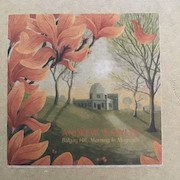 |
ANDREW
WASYLYK – BALGAY HILL : MORNING IN MAGNOLIA
( Vinyl/CD/Digital from Clay Pipe Music www.claypipemusic.com
)
I
am reviewing this record because although the
vinyl has already sold out on Pre-orders I feel
that it may receive a repress as is often the
case with Clay Pipe releases.
I
don’t know much about Andrew except that he is a
Scottish musician who was born Andrew Mitchell
who has previously released a few albums and
EP’s. This album is almost purely instrumental
apart from the title track album closer ‘The
Morning Of Magnolia Light’.
The
record opens with a very gentle bird song
infused melodic ‘Blossomlessness #2’, which
sounds very much like someone broken down on the
side of a busy road throwing open the doors and
windows allowing nature in, we hear a chaffinch,
a few crows and a distant drumming woodpecker.
As the sound of the road gradually disappears a
beautiful melody is played on piano, to a woozy
bed of electronics. A wonky guitar line
introduces us to ‘Through The Rose Window’ which
also features a trumpet, played by Rachel
Simpson, the song then takes in a very oriental
motif which reminds me of Tokyo Rose by Van Dyke
Parks. A
loping, lone guitar introduces ‘Magpie Spring’ a
delightful song which just reeks of Spring, the
keyboards and various electronics weave
throughout each other, it sounds very much like
a seventies children’s theme tune as played by
Vernon Elliott. ‘Sun Caught Cloud Like The Belly
Of A Cat’, introduces a very light percussive
beat, more trumpet, arpeggio guitars and
swirling electronics, shot through with yet more
bird song, a touch of slide guitar enhances the
cool melody.
‘Avril
Hydrangea’, is achingly beautiful, a pre set on
an organ plays the ascending and descending
melody whilst piano and mellotron combine
together to enhance it. More lonesome trumpet
heralds in ‘Western Necropolis Twilight’, which
I imagine would be a perfect headphone
soundtrack to a deserted night time city walk.
‘The Ghost Who Never Arrived’, swirls and
envelops us in a reverie, a beautiful, gossamer
light melody gradually unfurls. ‘Observatory In
Bloom’, is possibly my favourite, it’s just
beautiful, the melody is bright and busy, with
yet more bird song and plangent electric guitar
notes. Stately piano introduces ‘Smiling School
For Calvinists’ light percussion and woozy
keyboards make this a lively song, which for
some reason makes me conjure up a music teacher
teaching the song to his class of eager
students. The album closes out with the title
track ‘The Morning Of Magnolia Light’ a slow
soulful song which features the only vocals on
the album as the title is intoned over a
slippery slightly oriental sounding melody which
is injected with some cool brass before the song
collapses and we are right back at the start as
if it was all a dream.
(Andrew
Young)
|
| |
|
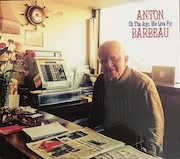
|
ANTON
BARBEAU – OH THE JOYS WE LIVE FOR
(CD/DL Big Stir Records www.bigstirrecords.bandcamp.com
)
The
very prolific Anton is back with a new album,
following hot on the heels of its predecessor
Manbird; a double album with an avian bent.
Anton wrote this album during the pandemic but
in no way are the songs about it but they do
reflect a period in his life in which travelling
around Europe and America playing his songs was
not an option, it also sees him pretty much
locked down on a farm. It would appear that he
has found a Vocoder for this latest outing,
which he uses to open the album with, intoning
the title ‘Oh The Joys We Live For’. It’s a very
playful song with some great rhyming couplets
like “Kittens In the barn, where Grandma keeps
her yarn” and “Kisses on the nose, the aphids
and the rose”. It also has guest Sharron Kraus
playing recorder and adding vocals. ‘Cowbell
Camembert’ is a typical Anton song, sly and
gently humorous, the kind of thing that Syd
could have written; it even features a cowbell
solo!
‘One
Of Her Super Powers’ is a jangly pop song with
some of the clever wordplay which he does so
well. ‘Filmik’,
is pretty mad, a short song for an imaginary
film score, which features vocals from Rosie
Abbott. He goes all mystic with ‘Crystals’ it
features searing, crashing lead guitar lines
from Bryan Poole, more recorder and vocals from
Sharron with some added Vocoder and jigger bells
played by Julia VBH. ‘When Life Brings You
Beer’, is about life on a farm, which Ant has
been living on during the pandemic, it’s about
growth and decay and of course beer, Christ
alone knows what instrument the solo is played
on, though it’s some sort of keyboard. ‘I Love
It When She Does The Dishes’ is a real soap
opera, a catchy, poppy song which again features
Sharron’s vocals and recorder plus some waspish,
backwards guitar from Bryan. ‘It’s Alright
Rosie’ is another song of domesticity, in which
he reassures his partner during the long nights,
we’ll adapt and survive, a cat and mouse saga,
imbued with slide and buzz guitars played by
Kevin Allison. ‘Three Days The Death Enigma’
which deals with a suicide, it has many keyboard
parts and flute played by Sharron. ‘Die
Smiling’, features Prophet’s 5 and 6 and has
some added skronking saxophone played by Fred
Quentin. ‘Saltlick’, is a bit more of a rocker
where Ant plays all the instruments. The album
ends with the very catchy ‘I Been Thinking ‘Bout
You’, and could be the only song to feature the
word Gobbledygook for the bridge, it also sees
his teeth turning blue, through unrequited
misery.
(Andrew
Young)
|
|
|
|
|
|
|
|
|
|
|
|
 |
|


